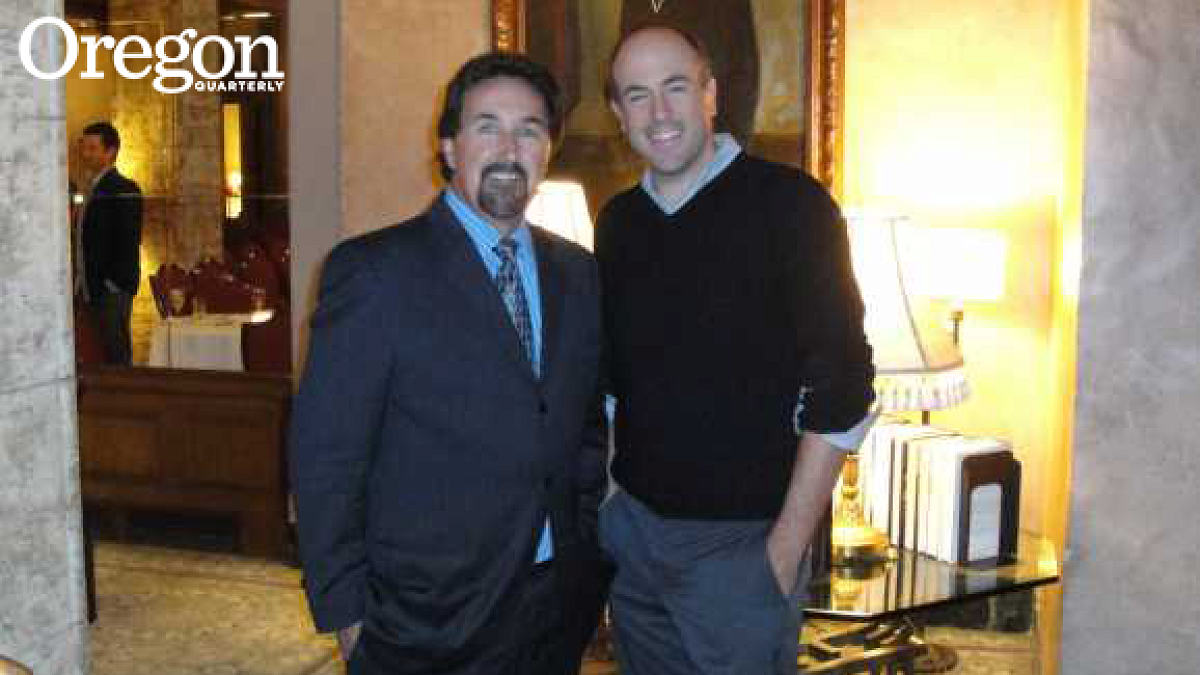It’s no surprise that people pay attention when UO alum Mike Jones ’97 talks—he’s the president of MySpace, an online social networking site with 120 million users worldwide. Jones recently joined six other UO alumni—all movers and shakers in Hollywood—at the stately Jonathan Club in downtown Los Angeles for “LA Confidential: UO Alumni on Media Mashups and Digital Dreams,” a dynamic panel discussion on the rapidly changing landscape of journalism and media in the age of Facebook and Twitter.
More than ninety Southern California Ducks attended the event hosted by the UO Alumni Association and the School of Journalism and Communication.
Writer-producer Bryce Zabel ’76 (Lois and Clark, and Pandemic) artfully guided the panel through a wide range of topics from the impact of social media on daily business practices to the role of ethics in the world of digital media.
Oregon’s Tim Gleason, dean of the J school, joined the panel and shared his insights on the challenges of educating new generations of communicators at a time when students are often ahead of their instructors on the technology curve. Zabel noted that Gleason came to the event well-equipped with the latest technology—a hip new iPad. For Gleason that’s a reflection of the school’s efforts to enhance traditional journalistic storytelling with emerging technologies.
Branding is the word, according to panelist Barbara Blangiardi ’79, a senior vice president at NBC Universal. Everything is a brand—from major television networks like NBC to individual television programs. Successful branding, she said, is key to attracting and retaining an audience that, in turn, attracts the advertisers who want to use your brand to sell their brand, and that’s how money is made in Hollywood.
Glenn Cole ’92 is the cofounder and creative director of 72andSunny, an international advertising and marketing company whose clients have included Xbox 360, Nike, Discovery Channel, and Quiksilver. He said companies need new media to expand their brands, but cautioned that if anybody tells you they know exactly what they are doing with it, they’re lying to you. He admitted assigning his own company’s Twitter and Facebook duties to younger staff members.
In television, knowing your audience is paramount. As executive vice president and co-owner of 44 Blue Productions, Stephanie Drachkovitch ’79 is a leading producer of nonfiction television programming, including MSNBC’s critically acclaimed Lockup franchise. Drachkovitch says social media has revolutionized the way producers learn what audiences think about specific programs. Gone are the days of small focus groups in remote television markets that dictate the viewing options for the entire country. Today there is instantaneous feedback online. This kind of immediate audience research has even generated support for successful program spinoffs, she said.
Neil Everett ’84, an ESPN SportsCenter anchor, provided the comic relief for the evening. Sporting Oregon Duckwear at the exclusive social club, Everett was nearly denied entry due to its unlike-L.A. dress code. “Am I the only one here who feels over-dressed?” he quipped. Asked if he uses social media or writes a sports blog to promote his on-air program, he replied wryly: “Only when I’m required to.”
Do people still read newspapers? Drex Heikes ’75, editor of LA Weekly, the nation’s largest alternative weekly newspaper, offered his thoughts on the challenges facing publishers in a digital world that demands instant access to information and ever more online content. The publishing industry struggles to remain relevant as the average age of readers skews higher and fewer young people turn to the printed page.
Jones—the youngest Duck on the panel—was seated center stage and frequently found himself the center of attention. He took on a major challenge earlier this year when he became president of MySpace. The company’s fortunes have faltered and Jones believes the company lost sight of its mission and diluted its brand. But he’s confident he can revitalize the social network. A great deal rides on his leadership as MySpace launches a reboot this fall.
Jones showed early signs of the success that was in his future. When he graduated from the UO he was named Student Entrepreneur of the Year, having established his first web-consulting business during his junior year.
Zabel asked the panelists what they thought was the most important skill that new graduates will need to successfully navigate the rapidly changing world of journalism and multimedia entertainment. The group almost universally agreed on an answer: the ability to write well and tell good stories—a timeless truism regardless of changes in technology. But Jones demurred—the only exception on the panel. While he agreed that the ability to write and tell stories is important, he believes that success lies in the ability to learn and use the tools that help you reach your audience.
Certainly nobody on the panel could disagree. Telling good stories is clearly the art and craft of their trade, but the ability to share those stories and connect with audiences will always be the key to their success.
—By Eric A. Stillwell ’85


